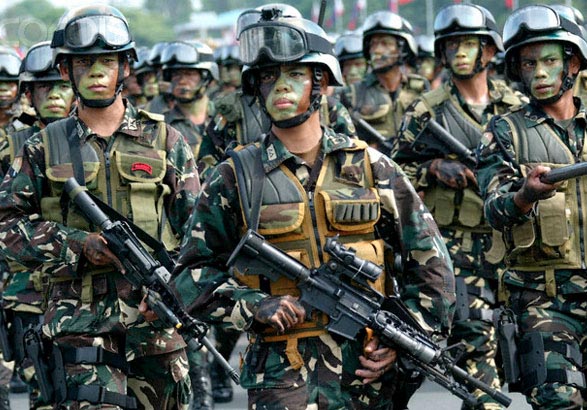An opinion piece by Emerlynne Gil, ICJ Senior International Legal Adviser in Bangkok, Thailand.
At least 14 people were killed and 71 injured in the bomb blast that rocked Davao City, Philippines, in the late evening of 2 September 2016.
Attacks like the Davao bombing are serious violations of international law, and may constitute crimes under international law.
Immediately after the attack, President Rodrigo Duterte announced that he would be using his powers under the Philippine Constitution to deploy the Armed Forces of the Philippines (AFP, photo) “to prevent or suppress lawless violence”.
He used the term “state of lawless violence”, clarifying that the circumstances were such that they would apply to the entire country.
His spokesperson later further clarified that the President would use his Constitutional power to deploy the AFP so that the military could “assist the police to fight crime and violence”.
At this point in time, it is not clear whether the military will be deployed in law enforcement operations solely in the context of countering “terrorism” or whether they will also be used to counter crime and violence in general, including during operations conducted as part of the ongoing “war on drugs” which has killed hundreds of people so far.
Under Article VII Section 18 of the Constitution, President Duterte is empowered to resort to the deployment of the Armed Forces “to prevent or suppress lawless violence”.
President Duterte has vigorously explained that he is not calling for martial law.
Neither does it amount to declaring a state of emergency under Article VI Section 23(2) of the Constitution, a power vested upon Congress.
In any event, even in times of “a public emergency threatening the life of the nation”, there are certain human rights from which no lawful derogation is ever possible, such as the right to life, the right to a fair trial, and the prohibition of torture and cruel and inhuman treatment.
Under international law, it is the duty of the government of the Philippines to take all necessary steps to protect people from acts of terrorism.
In addition, the government has the obligation to bring to justice perpetrators of acts of terrorism, by prosecuting and holding accountable individuals or groups responsible for such acts, not only as a matter of national security, but also to protect the rights and personal security of everyone.
It should be emphasized, however, that whatever measures the Philippine government uses to counter terrorism, they must comply with international law, in particular international human rights and humanitarian law and standards.
Experience from around the world has shown clearly that strengthening the rule of law in line with human rights standards is the most effective and sustainable response to countering terrorism.
Whatever it may be, the announcement that the military would be deployed to assist the police to fight crime and violence is in itself very worrying.
Granting law enforcement powers to the military is always very dangerous, and threatens to breach international standards.
Indeed, a military approach to law enforcement has been proven in many instances to expose the public to a wide variety of serious human rights abuses.
As experienced in many countries, soldiers who have been given policing powers are frequently unable to shed the military paradigm.
This was noted by Christof Heyns, the UN Special Rapporteur on extrajudicial, summary, or arbitrary executions, in his 2013 report on the situation in Mexico where the armed forces were given law enforcement duties as part of the country’s crusade to quash the powerful drug cartels.
The military and police have fundamentally different approaches and roles in discharging their primary tasks.
The military’s raison d’être is subduing the enemy through the use of force, including lethal force.
Law enforcement and policing operations, on the other hand, must take place within and adhere to a human rights framework, where use of lethal force may only be justified when strictly unavoidable to prevent the taking of life.
Any government force engaging in law enforcement operations, regardless of the uniform they wear, are subject to the UN Basic Principles on the Use of Force and Firearms by Law Enforcement Officials—a set of rules that the police are generally trained to follow, but the military are not.
Instead of giving the military a task they are not suited for by involving them in law enforcement, the Philippines may benefit more, especially in the long term, if efforts are focused on strengthening the capacity of the police.
There should be more resources devoted to beefing up the police’s forensic investigation skills and resources, increasing the number of recruits, and giving them sufficient and specialized training in countering organized crime, including countering terrorism.
The capacity of other authorities, such as judges, prosecutors, and other justice officers, should also be strengthened.
Independent courts and prosecutors and a functioning justice system are essential in the context of fighting crime, including terrorism, while simultaneously upholding the rule of law and human rights.
An independent judiciary, most especially, plays a critical role in all of this since it serves as a necessary check on the government as it pursues its own vicious counter-narcotics and counter-terrorism campaign.
President Duterte should know that the duty of the Philippine government to protect people from acts of terrorism does not collide with its obligation to promote and protect human rights.
In fact, the promotion and protection of human rights is a key element in fighting terrorism and is an effective weapon in fostering lasting peace and building a strong democracy.

